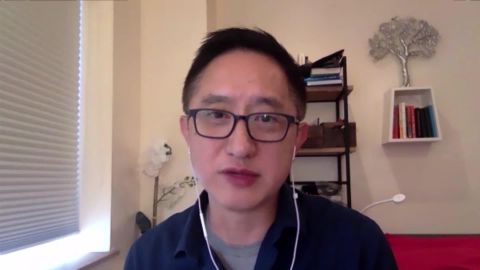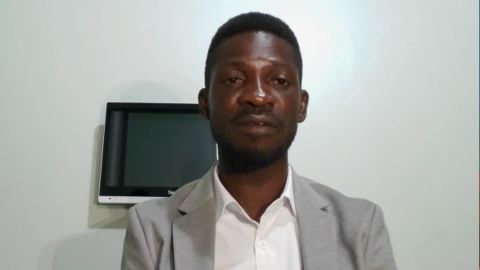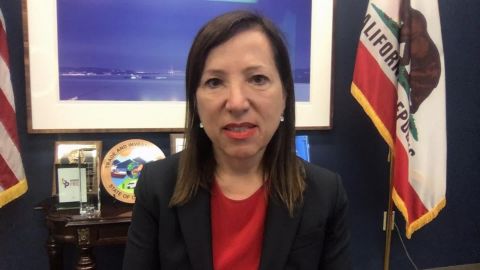Read Transcript EXPAND
CHRISTIANE AMANPOUR: When the virus overran Wuhan, the Chinese government imposed a 76-day lockdown. Now, in his harrowing new documentary “76 Days,” filmmaker Hao Wu takes us inside four of the city’s hospitals to share the gripping stories of patients and frontline workers. And here he is talking with our Hari Sreenivasan about those desperate efforts to combat what was then a mysterious illness sweeping through with Wuhan.
(BEGIN VIDEOTAPE)
HARI SREENIVASAN: Christiane, thanks. Hao Wu, thanks for joining us. There’s a scene in the beginning of the film that we want to play of people waiting outside of a door, banging the doors to get into the hospitals. Take a look.
UNIDENTIFIED FEMALE (through translator): I admitted 27 patients. There are still 36 outside. That’s more than 50 already. What if a fight breaks out outside?
UNIDENTIFIED MALE (through translator): People are dying. Open it?
UNIDENTIFIED FEMALE (through translator): Don’t knock on the door. We are opening it up.
UNIDENTIFIED MALE (through translator): Don’t know, otherwise we won’t open.
UNIDENTIFIED FEMALE (through translator): Don’t lean on the door. People can get trapped.
UNIDENTIFIED MALE (through translator): Don’t strike at the door. Stop it.
UNIDENTIFIED FEMALE (through translator): Three males. One by one.
UNIDENTIFIED MALE (through translator): One by one. Don’t pull at the door.
UNIDENTIFIED MALE (through translator): I can’t get in.
UNIDENTIFIED MALE (through translator): Otherwise, nobody gets in.
UNIDENTIFIED FEMALE (through translator): We will admit everyone. Do you all still want to get in? Please cooperate. We will get everyone in eventually.
SREENIVASAN: It’s almost impossible to think of nurses also having to work as crowd control to prevent fights. I mean, people forgot, this is almost a year ago. It is cold. People have been standing outside. How frustrated were the citizens of Wuhan with the response?
HAO WU, CO-DIRECTOR, “76 DAYS”: In the beginning of the lockdown, the lockdown order came down very suddenly. I think not just people in Wuhan, the rest of the country was also really confused because there was very little information going on. And also, it was really early in the outbreak and even scientists have very little data about how transmissible, how dangerous this virus was. So, there was just widespread panic in the city. Anybody who had any like flu symptoms, they just wanted to rush to the hospital to be checked out, to be admitted because they were fearful they’re going to transmit it to their own family as well. So, yes. I mean, just watching that scene sent chills down my spine as well, you know, after so many times just because just the fear, the panic in their voices.
SREENIVASAN: Was there a distrust of the government at that time? Because now we know in hindsight and through investigations that there was a discrepancy between the number of people that were getting infected and what the Chinese government was sharing with the outside world but also in China itself, where people are saying, wait, this could be worse than what I’m hearing?
WU: I think at the very beginning, because (INAUDIBLE) some more commercial publications in China, like Taichung (ph) and Sunday and this kind of big commercial publication, they did send reporters down to Wuhan to do some investigation. But overall, there haven’t been widespread coverage, especially among the state-owned media. So, people were not getting enough information to make a sound judgement about how bad the situation truly was. So, there was just a lot of distrust. They didn’t know what information was real at that time. At that time, a lot of people rely on social media. But as we all know, there’s a lot of misinformation on social media as well.
SREENIVASAN: Yes. Just so I’m clear, the two journalists that you were working with were in China, filming all these things, and you were in New York. You had just come back from China. One of the co-directors that you worked on this project with is listed as anonymous. How come?
WU: He’s a local photojournalist for a state-owned newspaper, and he — obviously, because he’s a reporter, he could get access to a lot of different hospitals and film there. He filmed the footage primarily just to keep records of what truly happened in history in the making. When we started talking about working together on this film, initially, he showed great reluctance. But in the end, I just told him, what I wanted to do really was to show the humanities that, you know, suffering through this pandemic, try to help each other to live through this pandemic. So, in the end, I convinced him to collaborate. But still, he was worried about what if what we portray — the way we portray the lockdown or the pandemic response, you know, was not well-liked, let’s say, by the government. Also, I think that nowadays, more importantly, he worries about any potential backlash on China’s internet because there are very strong nationalistic patriotic sentiment online that if there’s any negative portrayal of China’s response as unpatriotic.
SREENIVASAN: You chose to steer clear of politics in this document. Is that for fear of what the government would say?
WU: No, it’s definitely not out of fear because we actually have filmed whistleblower doctors and also, we filmed some dissidents who were trying to sue the government for COVID-19. But I think in the end, it’s also a reflection of our own transformation in the way how we think about this pandemic. I remember in early April I was editing in New York when New York was going through its worst in the initial wave of COVID-19. I’m hearing sirens everywhere. I literally felt like the same Wuhan story in “76 Days” were being replayed in New York City. So, at that time, I just feel like it was too early to draw any conclusion about any particular government’s response, whether it’s right or wrong, too draconian or too lenient. So, that’s part of the reason I decided to shy away from political commentary. That’s for another film, maybe two years down the road and looking back and give us the assessment. And secondly, because my two co-directors have gathered such powerful raw emotional footage on the frontline. I feel like any discussion about politics will actually distract the viewer’s attention from, you know, immersing themselves in these human stories of little kindness towards each other.
SREENIVASAN: One of the things I found interesting is that behind these masks, if you just changed the ethnicity of the patients and the doctors, this could have been doctors at the Elmhurst Hospital, in my neighborhood, it could have been doctors in Houston or in Phoenix or in Italy. I mean, the — it’s so sad how similar the plight of those workers have been over and over and over again.
WU: Absolutely. I was in touch with film-makers in Madrid who are filming hospitals in Madrid and also filming in Milan. And I was here. I started filming in late March here in New York City. I have many friends who are doctors in New York hospitals. Yes, the same stories were being replayed. And I think, you know, a lot of times, when we talk about COVID-19, about this pandemic, we’re talking statistics and political terms, we keep on forgetting behind the statistics and political arguments, there are real human beings, and it’s the same human stories all over.
UNIDENTIFIED MALE (through translator): Come on. You have no idea. I’d rather die immediately when I am in Pain. This disease cannot be cured in a short period of time. Who can stand this? Who wants to take this?
UNIDENTIFIED FEMALE (through translator): Why don’t you talk to your son some more?
UNIDENTIFIED MALE (through translator): Hello.
UNIDENTIFIED FEMALE (through translator): Hello.
UNIDENTIFIED MALE (through translator): He’s been a party member for decades. Remind him of that. Plus, his condition is not life threatening.
SREENIVASAN: You also chose not to show a lot of death. I mean, there was certainly hints at it and there were certainly images that we saw in the beginning, but you didn’t choose to give us a laundry list of everyone in those hospital wards that have passed.
WU: That’s right. I think primarily because most of the characters, my two collaborators were following, I think their own grandma passed away, but the rest them, I think, they all recovered. There are some side characters they filmed that passed away. But in the end, because their story didn’t make it into the film, so we didn’t highlight those deaths. In general, I feel like, with this film, it’s hard to because we were struggling with some ethical considerations as well during editing. We didn’t want to just show death gratuitously. You know, if we want to show death on screen, it has to serve a purpose.
UNIDENTIFIED FEMALE (through translator): Oh, dear, he was only 60. What a pity. Rich or poor, revered or despised, fate befalls all. What a tragedy. Nobody can escape.
SREENIVASAN: I mean, do you find that — you know, this is kind of a sensitive decision that a director has to make, but it’s — the argument also exists that, listen, shielding people from the reality of it gives them more license to ignore that reality. I mean, it’s something that the United States is still in.
WU: Yes. I think in China, there are many reasons why Chinese people in the end, right, just listen to the government’s directives and followed orders, but I think one thing that really contributed to them taking them this seriously is the availability of a lot of video evidence of how horrible this disease, COVID-19, is, not only on social media but also on TV broadcasters. Here in the U.S., I think even now for different reasons, we still don’t have enough. We’re still now showing the horrors of COVID-19 to our public to some degrees and we have read a lot of reporting, but just in terms of just being really up close and personal given bare visual evidence, I don’t think we have done enough.
SREENIVASAN: Your film finds these incredible small moments of kindness between the patients and the health care workers and you see it over and over again, whether it’s taking a video of a partner from one room to another so that they can kind of virtually see each other or it’s just holding the hand of a patient what doesn’t want to be alone. I mean, that gratitude that you capture, I’m sure it exists here in the United States as well for anybody who’s walked out of a hospital. But what’s also strange here is that we hear about patients who are with their dying breathe questioning whether COVID is real and pushing back against their doctors and nurses.
WU: Yes, that’s something that’s still very bizarre to me. It’s after hundreds of thousands of deaths in this country. We — a big portion of the population still refuse to accept that COVID-19 is real. That truly baffles me. I feel like this country has been so divided, and the message from the top leadership, the administration, the White House administration, has been so weak. I think that’s maybe partly why we see this kind of resistance to scientific fact about this pandemic.
SREENIVASAN: Was there resistance to the lockdown in China? Because what – – from your film and other places, what we see from the empty streets is that people complied. I mean, what is it — kind of two questions here, what is it about the culture that creates this almost paternalistic relationship with the state and this trust in state? And two, what about people who wanted to work again and wanted to feed themselves, weren’t they upset?
WU: I think in the beginning of the lockdown, because the — as soon as Wuhan was put under official lockdown and the rest of China, you know, basically went into voluntary lockdown. And fortunately, China was — there was the golden, you know, Chinese New Year holiday. So, people were staying home anyway. But in the very beginning, yes, there was a lot of grumbling in China about kind of the damage to the economy, about the measure being too draconian, and — but I think there have been reports as well, obviously, in — not just in western media but also Chinese media about how some local residents were resistant to the tight control that forced them to stay in their apartments and only allowed to go out to go get groceries once or twice a week. That was pretty drastic measures that the government imposed on Wuhan. So, there was initially some resistance. But, by and large, as you said, most people followed the orders. I think it’s not just China though. If you look at rest of East Asia, right, Korea, Japan, Taiwan, Hong Kong and Singapore, most of the population, they followed the government’s orders, maybe — I don’t know. I’m not a historian, but I think as an individual filmmaker, the way I look at it perhaps it’s because of the confusion culture because the people and the state, the religion is a bit different. You know, the state can be paternalistic and you — sometimes you listen to what the state has to say. And secondly, I think, maybe more importantly is in the rest of Asia there have been so many past outbreaks of viruses, right, like SARS. Most — people in East Asia remembered the fear of SARS. So — and since the governments tell me, you need to do this in order to stay safe, people immediately put their masks on, people immediately following the orders of shelter in place.
SREENIVASAN: You were in China right before all this happened to visit your grandfather who was ill, he passed away. When do you think you’ll be able to go back and find some closure to that?
WU: Yes, I was in — I arrived in Shanghai for Chinese New Year the day Wuhan was put under lockdown. I stayed there for about 10 days and came back. Right — as soon as I came back, I found out my grandpa was diagnosed with late-stage liver cancer and he passed away a month later. I wasn’t able to go back to say good-bye to him because, first of all, it happened really fast. Secondly, there was inbound travel restrictions in China by that point. So, I think this kind of guilt sort of guided me during the editing process, that’s why I decided to make — part of the reason why the film turned out to be what it is, which is when I was editing, I was always looking for the human connection, those little details because I needed that. I feel like I didn’t get to say goodbye to my grandpa. And then I was watching all of these patients being so scared and alone in their hospital bed, that was just unfathomable to me. So, yes. So, I guess in some ways “76 Days” is a tribute to my grandpa. And I hope, I really, really hope that coming springtime as vaccine becomes available, I will be able to go back to visit him at his grave and also to see my parents.
SREENIVASAN: The film is called “76 Days.” Hao Wu, thanks so much for joining us.
WU: Thank you for having me.
About This Episode EXPAND
California’s Lieutenant Governor Eleni Kounalakis joins Christiane to discuss the COVID surge in her state. Ugandan presidential candidate Bobi Wine discusses his race against President Yoweri Museveni. Director Hao Wu discusses his new documentary “76 Days.” Plus: two special reports on the state of the pandemic in Venezuela and Ethiopia’s Tigray conflict.
LEARN MORE


